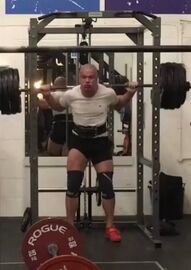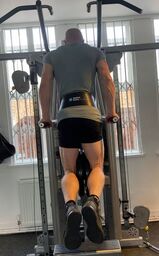What's Actually Important to Achieve Success in the Gym?
Effort, Consistency, Time and Progressive Overload
Effort, Consistency, Time and Progressive Overload
 Keys to suceeding in the gym
Keys to suceeding in the gym
How to make progress in the gym is often confusing to people. It’s understandable as the fitness industry is full of people trying to make it seem complicated as they have something to sell. Youtubers and people on Instagram have to post content regularly in order to stay relevant. There's only so many times they can post about the basic stuff and the things that actually are improtant
All this leads to people being confused and believing it’s more complicated than it really is and they spend ages worrying about minor details that really won't make the slightest difference.
I regularly have people who have only recently started training, or been training a long time and made little progress ask me questions about things that don't matter and knowing the answers will make little difference to their results. Asking questions and learning is always a good thing, but I would much rather their focus on the basics,. Without fail the people asking me but the people asking these questions aren’t getting enough sleep, binge drink every week, miss sessions regularly, don’t eat well for their goals and don’t actually train that hard.
They’re focusing on the stuff that makes up a tiny percentage of what’s needed to progress and ignoring the stuff that actually matters.
I've seen people make great progress following what on paper looked like poor programs because they got the basics right.
The four things that were always there when I, or my clients make progress and are vital are,
Effort
Consistency
Time
Progressive overload
Effort
Consistency
Time
Progressive overload
I've made some of my best progress following very simple training programs because I was doing the basics well.
The basics might not be exciting, but it's what's need to succed.
The basics might not be exciting, but it's what's need to succed.
Effort
Most people think they put in a lot of effort into their training but they don't.
Do you spend most of the training session talking instead of training?
Do you play on your phone resulting in taking longer rest periods than planned between sets?
Are you 100% focused when doing a set?
Do you quit a set the moment feels slightly challenging?
A lot of people haven’t ever exerted themselves physically in their life. As a result, once they start a training program they don't know how to exert themselves to a level that will produce results. Often they will convince themselves that they are, but they have much more in them.
Leg training is where you see it most. Leg training is hard and uncomfortable. It’s not unusual to see someone stop a set believing they could only do one or two more reps when in reality they had 5+ reps left in them.
I've tested clients on how much effort they put in each set by doing rest pause sets on an exercise like triceps push downs. The aim is to do as many reps as they can and rest 20-30 seconds before going again for 3-5 sets. If you're doing this properly and pushing the sets hard the reps will drop off massively with each set. However they actually get the same reps for every set. This is impossible if you push the sets close to failure, but they genuinely believed they were doing that.
This doesn’t mean you should push all your sets to failure, but it does mean you need to learn to be comfortable with being uncomfortable.
People often give up at the first sign of discomfort but then wonder why they haven't made any progress.
I see very few people training with any intensity and actually putting some effort in.
Do you spend most of the training session talking instead of training?
Do you play on your phone resulting in taking longer rest periods than planned between sets?
Are you 100% focused when doing a set?
Do you quit a set the moment feels slightly challenging?
A lot of people haven’t ever exerted themselves physically in their life. As a result, once they start a training program they don't know how to exert themselves to a level that will produce results. Often they will convince themselves that they are, but they have much more in them.
Leg training is where you see it most. Leg training is hard and uncomfortable. It’s not unusual to see someone stop a set believing they could only do one or two more reps when in reality they had 5+ reps left in them.
I've tested clients on how much effort they put in each set by doing rest pause sets on an exercise like triceps push downs. The aim is to do as many reps as they can and rest 20-30 seconds before going again for 3-5 sets. If you're doing this properly and pushing the sets hard the reps will drop off massively with each set. However they actually get the same reps for every set. This is impossible if you push the sets close to failure, but they genuinely believed they were doing that.
This doesn’t mean you should push all your sets to failure, but it does mean you need to learn to be comfortable with being uncomfortable.
People often give up at the first sign of discomfort but then wonder why they haven't made any progress.
I see very few people training with any intensity and actually putting some effort in.
Consistency
When I'm talking about consistency, I’m talking about about the consistently training with proper amount of effort.
Lots of people train hard for a short period. They’ll do too much per session and/or aim to do too many days a week, but then they end up stopping training. They come back back to the gym insisting they’ll stick to it and again stop. The stop-start cycle continues and they never make any progress.
I would rather my clients only train two days a week consistently for years than try and train more sessions and not be consistent.
While training hard is important, but problems arise when people allow the intensity to interfere with consistency. No single workout, no matter how good it was, matter that much.You don’t need to kill yourself every session.
What matters is putting in consistent work and making improvements over a long period of time.
Lots of people train hard for a short period. They’ll do too much per session and/or aim to do too many days a week, but then they end up stopping training. They come back back to the gym insisting they’ll stick to it and again stop. The stop-start cycle continues and they never make any progress.
I would rather my clients only train two days a week consistently for years than try and train more sessions and not be consistent.
While training hard is important, but problems arise when people allow the intensity to interfere with consistency. No single workout, no matter how good it was, matter that much.You don’t need to kill yourself every session.
What matters is putting in consistent work and making improvements over a long period of time.
Time
It takes time to build strength, gain muscle, get fitter and lose fat (though losing fat can be done fairly quickly). While you will get quicker results when you first start training, to achieve anything that’s impressive will take time and consistency. If you’re 30 years old and out of shape it’s unrealistic to expect that you’ll undo 30 years of inactivity in a couple of months of training. There aren’t any short cuts. You're not going to train for 3 months and look like someone who has trained for years.
Understand that this is a long term process.
Think in terms of months and years and not days and weeks.
Understand that this is a long term process.
Think in terms of months and years and not days and weeks.
Training is a Marathon, not a Sprint.
Progressive Overload
Ensuring achieving progressive overload over time is important should be obvious, but it's common for it not to be a priority for people. I'll often people hear talk about how many times a week they train, how long their sessions are or how many sets they do, how many sets they do, but rarely do I hear people talking about the progress they've made.
Most people will still be lifting the same weights in a year.
You should always be trying to make progress even if it's just an extra rep, or 1kg added. Stick with exercises long enough that you can track progress and see you are progression. If you're always changing programs, or worse just randomly picking things on the day it will be hard to make progress.
Progressive overload is the one way to know what you're doing is working.
The point of training is to make improvements and to get better and not to just do random work.
Most people will still be lifting the same weights in a year.
You should always be trying to make progress even if it's just an extra rep, or 1kg added. Stick with exercises long enough that you can track progress and see you are progression. If you're always changing programs, or worse just randomly picking things on the day it will be hard to make progress.
Progressive overload is the one way to know what you're doing is working.
The point of training is to make improvements and to get better and not to just do random work.
If you train with effort, consistency, with a focus on progressive overload for a long time, you'll suceed no matter what program you do.
If fail to do one of these you will fail no matter what you do.
If fail to do one of these you will fail no matter what you do.
These are the things that are needed. Even now, if I’m not making progress and look at these things and I’ll always find I’m slacking on one of them. The program I’m following doesn’t matter that much if these three things aren’t there.
I’ve made great progress following the most basic training program ever. I remember squatting 140kg x 7. Over three months the only weight I used was 140kg and built it upo to 14 reps. I then did the same for 160kg, 180kg and got up to 200kg x 7 reps. If I had posted this plan on an internet forum I would have been laughed at and told it was stupid. However I trained extremely hard, was consistent and was patient enough to see the results.
I’ve made great progress following the most basic training program ever. I remember squatting 140kg x 7. Over three months the only weight I used was 140kg and built it upo to 14 reps. I then did the same for 160kg, 180kg and got up to 200kg x 7 reps. If I had posted this plan on an internet forum I would have been laughed at and told it was stupid. However I trained extremely hard, was consistent and was patient enough to see the results.
Focus on the basics first.
Train with consistently with high effort and focus on progressive overload for years.
Only once you've done this does the other details matter.
Nail the basics. Train consistently with high effort for a long time and you will succeed
Train with consistently with high effort and focus on progressive overload for years.
Only once you've done this does the other details matter.
Nail the basics. Train consistently with high effort for a long time and you will succeed

